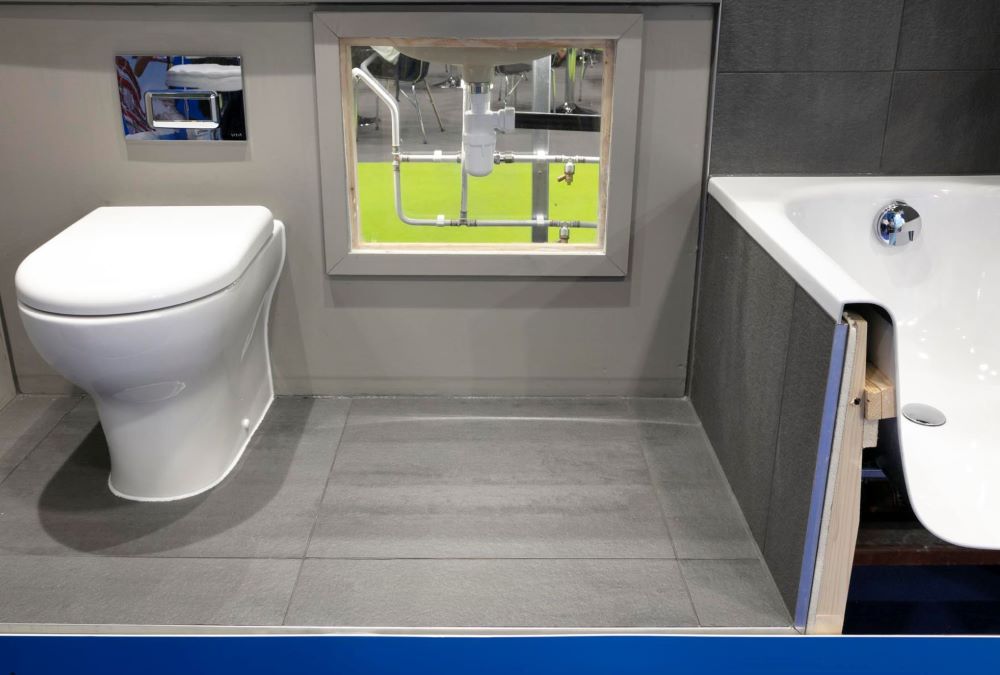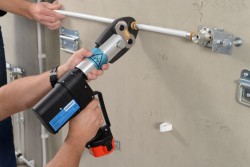Dave Lancaster, Senior Commercial Manager at Uponor, discusses how offsite construction and the systems used in modular assemblies have advanced in recent years and why housebuilders must adopt MMC to meet the demands of the housing crisis.
Historically, some of the biggest housebuilders have been sceptical about modular building. However, with last year's shortages impacting both materials and labour, the arguments in favour of offsite housing production have come to the forefront: fully fitted kitchen and bathroom pods can be delivered and bolted together onsite in a matter of days; factory-assembly provides greater quality control and less reliance on bands of subcontractors; wastage is minimised; and less time building homes should improve the key metric of return on capital employed.
Plus, with the number of new homes being built still requiring an increase of 24% to reach 300,000 homes per annum and meet government targets, more widespread adoption of modern methods of construction (MMC) is becoming the norm, as these numbers would be an extremely tall order using traditional methods of construction alone.
Building momentum
The statistics1 show that nearly 50,000 new homes were built in the first three months of 2021, the highest figure in over 20 years. But since then, the construction industry has been hit by a variety of challenges that have caused projects to suffer from delays and unanticipated costs. As a result, methods such as offsite manufacturing are gaining popularity due to its positive impact on productivity, and the speed to which homes, hospitals and schools are being constructed. In 2021, Savills predicted that the proportion of new housing developments built using MMC would need to increase from the current 6-10% to 20% of the market in the coming years in order to meet the Government's target of building 300,000 homes each year by 2025.
The construction industry has grappled with shortages of skilled workers for years as a result of ageing workforces, but the double shocks of Brexit and Covid have exacerbated these problems. In fact, in September 2021, The Office for National Statistics found that 43,000 jobs were unfilled across construction – the highest volume of vacancies in the sector for over two decades. In light of these pressures, offsite housing construction has the potential to achieve faster delivery on-site than traditional construction – with schemes completed in about two-thirds of the time, helping to avoid costly delays due to the lack of onsite labour available.
In addition to enhanced productivity, offsite construction is also proving to be a much more cost-effective method of building. In fact, the Buildoffsite report estimates that the cost of remedying construction defects onsite adds around 2% to an onsite project's overall cost, while onsite waste amounts to 3-5% of overall costs. In contrast, the costs for offsite manufacturing are close to 0% for remedying defects, and 1-3% for waste costs, demonstrating that offsite construction could actually help housebuilders to make substantial savings.
Furthermore, as well as helping to address the urgent demand for housing, modular construction could also play a major role in reducing the industry's carbon footprint as it is a greener way to meet the demand for new homes. Factory-controlled environments allow production methods to be streamlined, resulting in less waste and higher efficiencies. Any waste that is produced can also be better controlled and recycled, with less risk of contaminating other materials. Energy use can also be regulated more easily in a factory setting, and, as fewer lorries – and people - are required to deliver fully fitted modules to site, carbon emissions are reduced significantly.

Advances in technology has also meant that modern pipes such as Uponor's MLCP are the perfect choice for factory-based construction of modular units that require domestic services and energy efficient heating systems. Its unique construction and flexibility means our MLC, is form stable when bent and with a 40 % smaller bending radius means fewer fittings are required, reducing the risk of leakages. It is a cost-effective system in both time of installation and number of fittings required for each pod, and with our support and expertise in design and installation we can reduce overall wastage. Uponor's range of pipe sizes means you can select the appropriate pipe sizes for your design, to optimize flow rates for end user comfort and reduce water waste, promoting environmental sustainability.
The future lies in modular construction
As modular building becomes increasingly advanced, it is clear that offsite construction now offers enhanced productivity, quality control, and return on investment which will help us to create an integrated way of working that has the potential to transform the sector. The need for new homes combined with the growing pressure on the sector to cut carbon emissions and tackle sector-wide shortages, means that modular construction must now be seriously considered by housebuilders, both large and small.
If we truly wish to revolutionise the industry, meet targets and create the high-quality, technologically-advanced, energy efficient homes of the future, it could be time to leave the dangerous, wasteful building sites behind and consider the fact that housebuilding's future may well be in the factory.
For more information visit https://www.uponor.co.uk/.









